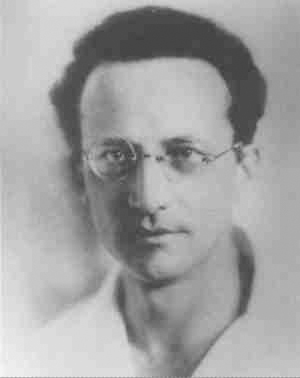Erwin Schrödinger
Erwin Schrödinger (12 August 1887 – 4 January 1961) was an Austrian-Irish physicist and a key figure in the development of quantum mechanics. He is best known for his work on the wave function and the Schrödinger equation, which describes how the quantum state of a physical system changes over time. In 1933, Schrödinger was awarded the Nobel Prize in Physics for his contributions to the wave theory of matter and to other fundamentals of quantum mechanics.
Early Life and Education[edit | edit source]
Erwin Schrödinger was born in Vienna, Austria, in 1887. He was the only child of Rudolf Schrödinger, a botanist, and Georgine Emilia Brenda, a daughter of Alexander Bauer, a professor of chemistry at the Technical University of Vienna. Schrödinger showed an early interest in science and mathematics. He attended the Akademisches Gymnasium in Vienna and later enrolled at the University of Vienna, where he studied physics under the guidance of Fritz Hasenöhrl. He received his PhD in 1910 for a thesis on the conduction of electricity in gases.
Career[edit | edit source]
After completing his doctorate, Schrödinger held various academic positions. He served in the Austrian army during World War I. After the war, he worked as an assistant to Max Wien in Jena, and later to Max Planck in Berlin. In 1921, he became a professor at the University of Zurich, where he developed his most famous work, the Schrödinger equation, in 1926. This period was marked by his significant contributions to quantum mechanics, including the concept of wave-particle duality.
Schrödinger's work on quantum mechanics led to his receiving the Nobel Prize in Physics in 1933, which he shared with Paul Dirac. His discovery of new productive forms of atomic theory significantly advanced the field.
In 1933, due to the rise of the Nazi regime in Germany, Schrödinger decided to leave the country. He held a position at the University of Oxford in England before moving to Graz, Austria, in 1936. However, the political situation in Austria forced him to leave again in 1938. He found refuge in Ireland, where he became the Director of the School for Theoretical Physics at the Institute for Advanced Studies in Dublin, a position he held until his retirement in 1955.
Legacy[edit | edit source]
Erwin Schrödinger's contributions to physics, particularly to quantum mechanics, are monumental. The Schrödinger equation remains a fundamental tool in the study of quantum systems. Beyond his scientific achievements, Schrödinger was known for his philosophical inquiries into the implications of quantum mechanics, as evidenced in his famous thought experiment, Schrödinger's cat, which illustrates the problem of quantum superposition.
Schrödinger also made contributions to other areas of physics and science, including statistical mechanics, thermodynamics, and color theory. His interdisciplinary work and philosophical approach to science have left a lasting impact on both physics and the philosophy of science.
Death[edit | edit source]
Erwin Schrödinger died in Vienna on 4 January 1961. His legacy continues to influence the fields of physics, quantum mechanics, and beyond. He is remembered as one of the founding fathers of quantum mechanics and a pivotal figure in 20th-century physics.
Search WikiMD
Ad.Tired of being Overweight? Try W8MD's NYC physician weight loss.
Semaglutide (Ozempic / Wegovy and Tirzepatide (Mounjaro / Zepbound) available. Call 718 946 5500.
Advertise on WikiMD
|
WikiMD's Wellness Encyclopedia |
| Let Food Be Thy Medicine Medicine Thy Food - Hippocrates |
Translate this page: - East Asian
中文,
日本,
한국어,
South Asian
हिन्दी,
தமிழ்,
తెలుగు,
Urdu,
ಕನ್ನಡ,
Southeast Asian
Indonesian,
Vietnamese,
Thai,
မြန်မာဘာသာ,
বাংলা
European
español,
Deutsch,
français,
Greek,
português do Brasil,
polski,
română,
русский,
Nederlands,
norsk,
svenska,
suomi,
Italian
Middle Eastern & African
عربى,
Turkish,
Persian,
Hebrew,
Afrikaans,
isiZulu,
Kiswahili,
Other
Bulgarian,
Hungarian,
Czech,
Swedish,
മലയാളം,
मराठी,
ਪੰਜਾਬੀ,
ગુજરાતી,
Portuguese,
Ukrainian
Medical Disclaimer: WikiMD is not a substitute for professional medical advice. The information on WikiMD is provided as an information resource only, may be incorrect, outdated or misleading, and is not to be used or relied on for any diagnostic or treatment purposes. Please consult your health care provider before making any healthcare decisions or for guidance about a specific medical condition. WikiMD expressly disclaims responsibility, and shall have no liability, for any damages, loss, injury, or liability whatsoever suffered as a result of your reliance on the information contained in this site. By visiting this site you agree to the foregoing terms and conditions, which may from time to time be changed or supplemented by WikiMD. If you do not agree to the foregoing terms and conditions, you should not enter or use this site. See full disclaimer.
Credits:Most images are courtesy of Wikimedia commons, and templates, categories Wikipedia, licensed under CC BY SA or similar.
Contributors: Prab R. Tumpati, MD





